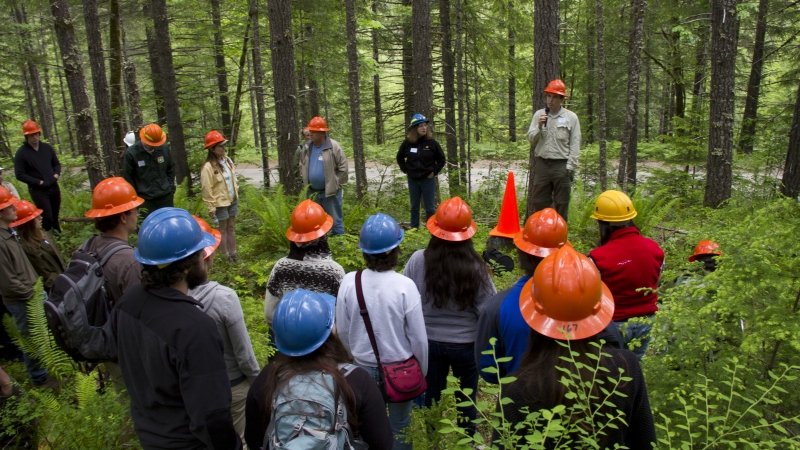Continuing Education
Field Courses and Tours of the Andrews Forest
Andrews Forest researchers and staff provide tours and field lectures to diverse audiences, including students, visiting researchers, forest managers and the interested general public. Tours are tailored to the interests of the group, providing overviews of the research program, and explaining ecosystem processes, disturbance history and forest management. We average close to 50 tours per year, reaching more than 1,000 participants.
The Andrews Forest field station is used for regional and international workshops and conferences. The field station hosts several management workshops each year in conjunction with the Willamette National Forest and the Central Cascades Adaptive Management Partnership. We also host a number of research conferences and workshops.
As the scope of the Andrews Forest Program expands, the facility is seeing new and diverse user groups, such as humanities and philosophy gatherings, community development workshops, and K-12 teacher training.
OSU Extension and Outreach Partnerships
The Andrews Forest Program has a strong partnership with the Forestry and Natural Resources Extension Program at Oregon State University. The partnership combines the communications expertise of Extension with Andrews Forest science and scientists to link to natural resource managers and other decisions makers, especially with respect to climate, climate change, and climate impacts on natural and managed ecosystems. Oregon Season Tracker is an example of the partnership among researchers, extension and landowners around the state of Oregon.
Andrews Forest Events and Meetings
The Andrews Forest LTER program hosts annual meetings and events: HJA Day, Symposia, Monthly Meetings. See our events and meetings page for more information.
Research-Management Partnership
Researchers and managers connect their ideas through field tours, short descriptions of applications of science findings in the land management setting, longer publications outlining current management issues and related science findings and studies, and webpage descriptions of projects, findings, and adaptive management decisions. Communications are intended to benefit land manager users of the information, general public, students, educators, and decision makers.
The Central Cascades Adaptive Management Program (CCAMP) is an intersection of state and federal organizations, coming together to integrate their science and natural resource management talents to develop solutions to complex natural resource challenges. CCAMP evaluates its role in natural resource management on a regular basis to maintain its relevancy to current issues. CCAMP offers a variety of tours and workshops to bring these partners together to achieve their goals.
Post-doctoral trainees
Many Researchers at the Andrews Forest support and sponsor post-doctoral trainees to work on various aspects of research projects.
Long-term Ecological Reflections
The Andrews Forest LTER Program; the Spring Creek Project for Ideas, Nature, and the Written Word; and the USDA Forest Service are collaborating in a program that brings creative writers, humanists, and ecosystem scientists together at the Andrews and in other natural venues in the Pacific Northwest. This program called Long-Term Ecological Reflections supports writers and humanists in their efforts to explore human/nature relationships as they evolve over many lifetimes.

